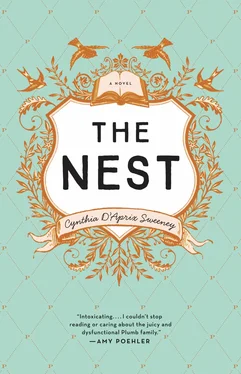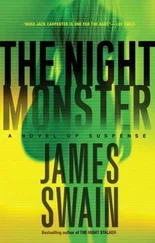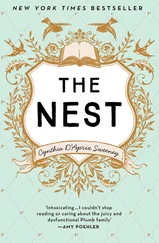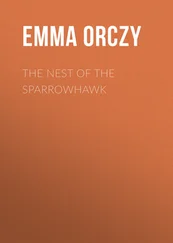Leo held Bea’s hand so tightly her fingers were numb. “Careful, Superman,” she said, wriggling her fingers and loosening his grip a little.
“Superman. Right.” Leo lightly touched his chin and winced. “I could use Superman right now. Have him fly and reverse the earth’s rotation to go back in time.”
“Before the really dry crab cakes were passed?” Bea said, trying to distract Leo from the crying she could hear on the other side of the curtain.
“More like to early 2002,” he said.
That sounded good to Bea—2002, the year before he sold SpeakEasyMedia and met Victoria; Tuck still alive; her book newly published. The year that was the dividing line, in Bea’s mind, of the Leo she loved, the Leo who was one of her closest friends, gradually disappearing and morphing into someone unrecognizable.
Leo looked like he might cry. She was scared for him. “How did I get here?” he said. She was trying not to stare at the split in his chin. He was going to have a scar. “How did I fuck up this badly?”
In spite of the circumstances, Bea’s heart billowed to hear something approaching self-reflection and regret, something hinting at an apology coming from Leo. It had been a long time.
“It’s going to be okay,” she said, feeling helpless.
“I don’t know about that,” Leo said. There was a slight commotion on the other side of the curtain. The parents seemed to be arguing in Spanish, and the translator was trying to intervene. “I think it might be the furthest thing from okay,” he said.
Bea put her hand on Leo’s back, and he leaned into her a little. She motioned George closer and spoke softly and quickly, before she could change her mind. “I heard something else.”
“What?” George said.
“The parents are undocumented.”
George smiled for the first time since arriving at the ER. “ That is much better news. Good work.” He pointed a finger at Leo. “This is still going to cost you a fucking fortune, but I can use this.”
From the other side of the curtain, Matilda’s voice rose above the ongoing bickering, louder and more insistent. “Tómelo, Mami, tómelo!”
Tómelo. Take it. Take the foot. Then the translator speaking to the surgeon: “They want you to amputate.”
“I think that’s the right decision,” the surgeon said. “We’ll get a clean cut. Leave as much bone as possible.”
Morning, West Seventy-Sixth Street. Bea was sitting in the pre-sunrise dark, holding a cup of chamomile tea with both hands, waiting for the heat from her favorite mug — the one she’d gotten the lone year she’d capitulated during the public radio fund-raising drive and pledged a premium — to warm her stiffened fingers. The kitchen table was in its winter location, awkwardly wedged into an interior corner, partly blocking the doorway to the living room but well away from the exposed wall and the two battered windows that looked out onto an air shaft populated by a disturbing number of pigeons and God only knew how many rodents. She knew she was lucky to have windows in the kitchen, was lucky, in fact, to have a kitchen big enough to house a table, but the rope-sash windows were as insulating as a piece of ClingWrap. The abraded wood would swell in the summer heat, and the layers of old paint and putty would become malleable and gummy, making the windows impossible to open. In the winter, the wood would shrink, letting in preposterous amounts of cold air. Sitting wrapped in a bulky sweater over her nightgown, she waited for the telltale hiss and bang of the radiator pipes, signaling 6:30 A.M. and only ten more minutes until the room was decently warmed. She was up too early; it was cold.
Bea couldn’t sleep for two reasons. The first was because of the horrible party at Celia’s. The second was no doubt directly related to the first: She’d had an upsetting dream about Tuck. She didn’t dream of him often, which was good, because he was usually tense and frustrated in her dreams. Dream Tucker couldn’t speak, just as he’d been at the end of his life after the stroke. Sometimes he’d write something down in the dream, but she could never read it — either the words were blurred or she kept misplacing the piece of paper or, on the rare occasion she did manage to read what he’d written, she could never remember what it was when she woke in the morning. Sometimes the dreams clung to Bea all day, leaving her unsettled and jittery, gloomy. Like today. She wondered why a relationship that in real life had been so sustaining and even-keeled was so fraught in her dream life. She decided that Tucker represented the part of her unconscious that struggled with writing, and that made perfect sense to her: why the deep recesses of her mind and soul would seize on Tucker as the right vehicle to deliver her own dissatisfaction to herself. He’d been dead for almost three years and she still thought of him constantly, mostly as he was when she first met him, standing in front of a classroom, reading poetry to his students, mesmerizing them with his sonorous voice, the voice he’d so cruelly lost use of at the end.
Bea had taken a class with Tucker after her book came out, after a year in Seville where she found herself so disoriented and adrift that she did little else than sit in tapas bars, smoking and sipping sherry, practicing her Spanish and writing funny postcards to her friends. She came home nearly fluent but empty-handed in terms of word count.
“How about joining a writing group or taking a class?” Stephanie had suggested, not concerned yet.
“A class?” Bea said.
“Not a fiction class, something else. Poetry. Nonfiction. Just to get the wheels greased. It might be fun.”
“Like go to the New School and sign up for Introduction to Poetry?” Bea was pissed. She had an MFA.
“No, of course not. Something at your level. Like how about Tucker McMillan’s class at Columbia. He’s amazing. You could audit.”
Bea ignored Stephanie’s suggestion only to find herself a few days later at a party standing before Tucker. She was mesmerized. He was appealingly craggy in the way of some older men who seemed to finally grow into their generous features in middle age. She’d seen pictures of him when he was younger and thinner and seemed burdened by his own physicality, nose too large, mouth too generous, ears too wide — but when she met him, some alchemy of time and girth and weathering of his face made him beautiful. And his voice. It was one of the biggest regrets of her life (and that was saying something) that she didn’t have his voice on tape anywhere.
“Ah, Beatrice Plumb,” he’d said, taking one of her hands in both of his and giving her his full attention. “As pretty as your picture.” Bea hadn’t known then if he was making fun of her. It was shortly after the “Glitterary” piece came out and although the photographer had taken what felt like hundreds of pictures of her for that article — at a desk, leaning against a window, curled in a chair — he’d chosen to use one of maybe three shots he’d snapped at the very end of the day when she was exhausted and had collapsed on her bed for a minute while he was changing lenses. “Hold it right there,” he’d said and had stood on a chair at the end of the bed and shot her from above, reclining, arms stretched to her side, looking sleepy and patently alluring (she had been flirting with the photographer a little, but not with the world) . The picture had been ridiculed on various media sites, written about more than anything she said in the article. She was still angry about the stupid photo, which, in any context other than work, she would have quite liked.
“Not the one I would have chosen,” she’d said, trying to sound dismissive but not defensive.
Читать дальше
Конец ознакомительного отрывка
Купить книгу












